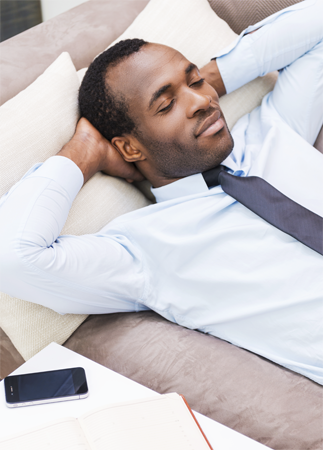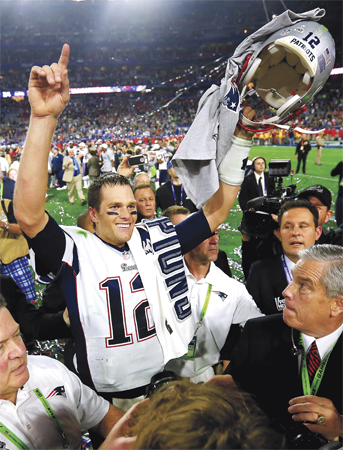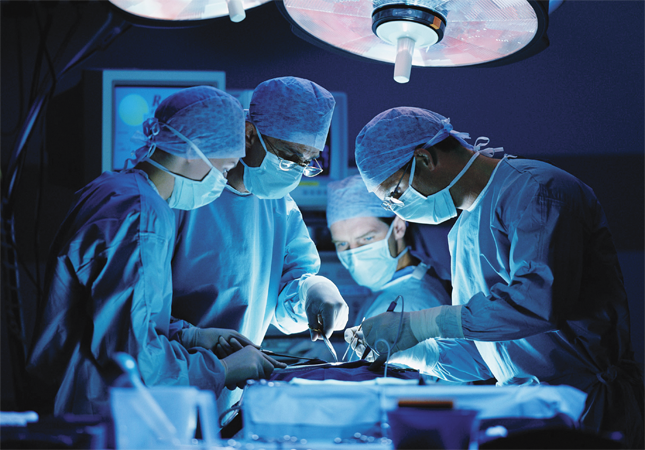
Sleep Like a Pro
Being at the top of your game takes work. Here, secrets from athletes, CEOs, cops, airplane pilots and others
BY JUDY MCDONALD

THERE ARE MANY THINGS WE MORTALS have in common. We all need to eat at semi-regular intervals. We all need shelter from the elements and safety from harm. And we all need sleep. But how we go about each of them—and especially, we are learning, the last—can make a big difference in how well we live.
Take New England Patriots quarterback Tom Brady, who has led his team to six Super Bowl victories. Brady obviously trains rigorously and is blessed with extraordinary talent. But he also attributes much of his success on the field to his insistence on rest. “The decisions I make always center around performance enhancement,” he has said. “I love the game, but I also know that if I want to do it for a long time, I have to do things differently than the way guys have always done it.” Brady told ESPN that “doing things differently” means going to bed well before people his age typically do.
That’s because Brady, like many of the world’s most disciplined and successful people, understands the power of proper rest. He has plenty of company. In 2014 the National Collegiate Athletic Association (NCAA) created a mental-health task force that made sleep its No. 1 priority. Urban Meyer, head coach of the 2015 NCAA football champions, the Ohio State Buckeyes, says that he “sees a day when players’ sleep patterns are monitored.”
But it’s not just in the world of sports. Warren Buffett, who may be the world’s most successful investor, is similarly greedy about his sleep, recommending rest even over profit. He arrived at Salomon Brothers in the early 1990s with this advice to every worker in the New York office: “Why don’t you go home and get a good night’s rest, and we’ll meet again tomorrow.”
Research suggests that these A-gamers are onto something. The University of Ottawa—where I am a scientist in the Operational Readiness Unit at the McLaughlin Centre for Risk Science in the Faculty of Medicine—has conducted extensive studies focusing on a new discipline called operational readiness. It correlates research with the performances of Olympic athletes and people in high-risk occupations, like police and surgeons, whose standards of excellence have life-and-death consequences. Our ongoing work makes it clear that effective sleeping and resting practices impact our technical, physical and mental readiness.
So what can we learn from them? Plenty. Here are some of the key techniques used by elite performers compiled by researchers at the University of Ottawa.
DON’T TRY TO TOUGH IT OUT
“The old-school approach of toughing it out is completely bogus, not to mention counterproductive,” maintains Charles Czeisler, director of the division of sleep medicine at Harvard Medical School. Traditional sports and professional environments are changing to improve sleep habits and enhance performance. Research links sleep deprivation to serious health and performance consequences. In safety-sensitive environments, sleep needs to be part of what’s called operational fatigue risk management.
Czeisler, known around the National Basketball Association (NBA) as the “sleep doctor,” recommends something simple for maximizing elite athletic skills: more sleep. Czeisler, who is also a consultant to NASA and the Secret Service, offers generally accepted advice: naps before games or shifts and seven to nine hours each night. Interestingly enough, when it comes to training, the sleep after an event can be equally important. Sleep helps build long-term memories, and that applies directly to learning. Too little sleep means that important steps in integrating the new memories are missing.
We know that sleep deprivation impacts both mind and body. According to Steven Feinsilver, a sleep-medicine specialist in New York City, “getting too little sleep can have serious health consequences, including depression, weight gain, heart disease and probably mortality.” It has been shown to affect police officers’ health and job performance; shift work, in particular, contributes to excessive fatigue and undiagnosed sleep problems. The lack of sleep in other professions—surgery, air-traffic control—puts people and operations at risk.
The bottom line? As Czeisler says, “We now know that 24 hours without sleep or a week of sleeping four or five hours a night induces an impairment equivalent to a blood alcohol level of 0.1%. We would never say, ‘This person is a great worker—he’s drunk all the time,’ yet we continue to celebrate people who sacrifice sleep for work.”
PUT SLEEP ON THE CALENDAR
Surgeons accommodate sleep through discipline. Their day is planned to be as consistent and predictable as possible. The night before an operation, you don’t party, you don’t drink, you don’t take a Valium. You take care of your routine, and the routine takes care of you. Many NBA coaches are also trying to build sleep-friendly routines. A typical night game, for example, ends at about 10 p.m. After showering, dressing, doing media interviews and having a late-night dinner, most players will not get to sleep until 2 a.m. or even later if the team is traveling. They can easily become at risk for being chronically sleep-deprived.
And yet the morning shoot-around has been a staple practice of the NBA game-day routine since the early 1970s. With the growing appreciation of the findings of sleep science, however, several teams have dropped the early-morning practice altogether, recognizing that the players, if they’re going to be at their best, need more sleep time to recharge and perform better.
HONE YOUR COPING SKILLS
Psychological and emotional well-being, much as we sometimes treat it like a luxury, is critical if we want to be fully functional. And that applies to getting a good night’s sleep. Elite performers learn that effective coping strategies are essential, and that doesn’t mean shoving them under the rug. Disappointments must be resolved to clear consciences and prepare the mind and the body for rest. One strategy to achieve that is being honest and open. “If you’re honest with yourself and you’re honest with your patients,” one doctor told me, “you can function because you have a clear conscience. That helps a lot in putting up with the stress.”
Police officers often report that they rely on a good work-life balance to feel rested between shifts. “Sometimes you have to take a break. Do something unrelated that will clear your mental and physical state—just to get recharged,” advises one cop. Days off are significant for recovery: “You have to refresh yourself. There are times we work weeks straight, no days off. I know my body, and I know that if I keep pushing, pushing, pushing, I’ll break down.”
Intuitive as this may be, there’s also strong evidence that anxiety and depression can both cause insomnia, as well as the other way around: lack of sleep is strongly associated with depression and other mood disorders.
BE WHERE YOU ARE
One of the most effective means to reduce stress is through mindfulness meditation, and plenty of research shows it can have a dramatic impact on sleep. If sitting still on a cushion with your eyes closed is not your style, other relaxation techniques that emphasize paying attention to the present moment can also help. An easy way to start is to sit down, take a breath and simply commit to being aware of the present moment. Slow, deep breathing sends calming signals to the brain, which in turn can slow heart rate and nervous activity, prepping the body for rest. Breathing exercises, particularly when performed ritualistically before bed, can also prepare the body for rest.
This skill of remaining “in the moment” has become a worldwide phenomenon in professional sports. As one European national tennis champion confided in me: “I used to freeze up whenever I made a mistake—I was sure that I wasn’t in the same league as the [Roger] Federers and the Andy Murrays. Now when I blow a serve or shank a backhand, I still get those flashes of self-doubt, but I know how to handle them: I acknowledge the negative thoughts and let them slide by, focusing on the moment.”
Ted Bober, director of clinical services for the physician health program at the Ontario Medical Association, trains surgeons, physicians and other professionals in many of these techniques. He explains that being mindful allows self-monitoring of fatigue that results in making decisions in skilled, levelheaded ways. Charles Francis, the author of Mindfulness Meditation Made Simple, says “Not only does it improve our mental abilities—which makes us more productive—but it also improves leadership skills.”
GET A HANDLE ON TIME ZONES
Jet lag is more than a mere time adjustment—it’s a circadian-rhythm disorder that can wreak havoc with your body. Your internal body clock is only one of many factors affected by air travel that can exacerbate sleeplessness. Extended sitting in an airplane, being in a compressed-air cabin chamber, eating on an unpredictable schedule—all take a physical toll.
A seasoned flight attendant shared his practices in dealing with ongoing overseas travel. First, he recommends slowly sipping water during flights. “Dehydration makes you feel like [you’re in] a revolving restaurant,” he said. “That’s why you can’t sleep: because your body doesn’t feel right.” Some airline personnel swear by water with electrolytes or vitamins, but just plain water will do.
Being a smart traveler also involves being patient. Give yourself time to acclimate to your new time zone. “Pay attention to how your body reacts as you adjust to time changes,” advises a successful international business consultant. He also finds that personal wake-up routines, such as exercising, getting sun exposure and avoiding alcohol for the first few days, can speed up the adjustment. With business meetings, he often defers decision-making until he feels in step. “Some say one day of adjustment for every hour of time change. I find you need about a week at either end, whether it is a difference of six hours, 10 hours or more. For important events, it is helpful to allow extra time to become localized and acclimatized. That’s why Olympic athletes arrive a month ahead of competitions.”
WHEN YOU’RE BEAT, HAVE A PLAN B
Here’s some irony: for peak performers, long workdays and interrupted sleep patterns are frequently standard occupational hazards. And although health experts agree that’s not ideal, it happens. And when it does, these professionals have insight into how to stay on your game when you’re exhausted.
It may seem counterintuitive, but maintaining alertness during low-workload periods requires considerable mental stamina and can cause even more fatigue. Air-traffic-control studies in both the U.S. and Canada in which human attentiveness in air-traffic incidents was examined, for instance, show that operational errors occur most frequently during conditions of low rather than high traffic.
Similarly, surgeons recognize that when their concentration is interrupted, it is more difficult to be alert, relaxed and meticulous. “If I’ve been up all night the night before, it makes everything more painful,” a surgeon told us. “It affects some of the more mundane aspects of the operation, not the operation itself.” Dealing with the lulls is essential.
Here’s what doctors recommend: bringing backup. “The way I cope with fatigue is usually having somebody senior to scrub in with me,” says one, “and sometimes I step out for a little while, take a break and come back in.” When fatigued, police also find strength in numbers. “Call me chicken,” one officer says, “but I’m going to bring some friends with me.”
LEARN TO REST—ANYWHERE
Sleep experts are mixed on the benefits of napping, cautioning that catching up on sleep through micro rests doesn’t cut it. But most doctors agree that if you aren’t getting enough sleep at night, napping can be a boon.
Napping is definitely big-league in the NBA, according to an article in the New York Times. LeBron James swears by his siesta. So did Steve Nash. Derrick Rose sleeps three hours before every night game, and Kobe Bryant used to check into a hotel before home games for his pregame nap. While “NBA players may be the kings of nap,” reports the New York Times, the NHL is not far behind. For many hockey players, a traditional one-, two- or three-hour afternoon snooze is critical to their game prep.
Some experts think that’s overkill. Charles Samuels is the medical director of Calgary’s Centre for Sleep & Human Performance and has worked with Canadian Olympians. He also served as a performance consultant for the NHL’s Calgary Flames. He warns that a nap is a survival technique, not a replacement for quality sleep—and it should be limited to 30 minutes. “Players need to maintain a routine where they get a dominant amount of nighttime sleep and only use the nap as a recovery strategy.”
Even a quick break to relax can restore energy, aid in anticipating the next step and renew a positive perspective. That’s as true for surgeons as it is for police officers. Bill Gates shares this view. He used to work through the night, relying on midday naps for rest, but realized that he couldn’t enjoy a high quality of life that way: “I like to get seven hours of sleep a night because that’s what I need to stay sharp and creative and upbeat.”
WORK WITH WHAT YOU’VE GOT
Genetics can influence your preferred sleep patterns—most of us are either naturally morning people or night people—which means you should work with what you’ve got to achieve your best personal performance. Heredity may also influence both the quantity and quality of your sleep, and some of us are much more vulnerable to the adverse effects of sleep loss. To optimize whatever your natural inclinations are, be consistent with your sleeping patterns. Make sure to allocate enough time for both sleeping preparations—winding down, eliminating distractions—and sleep. Develop good bedtime routines that work for you and then strive to be consistent.

EARLY TO BED New England Patriots quarterback Tom Brady attributes much of his success on the field to his good sleep habits.

HEAL THYSELF Smart surgeons learn to balance their work and rest in order to minimize fatigue and perform at optimal levels.